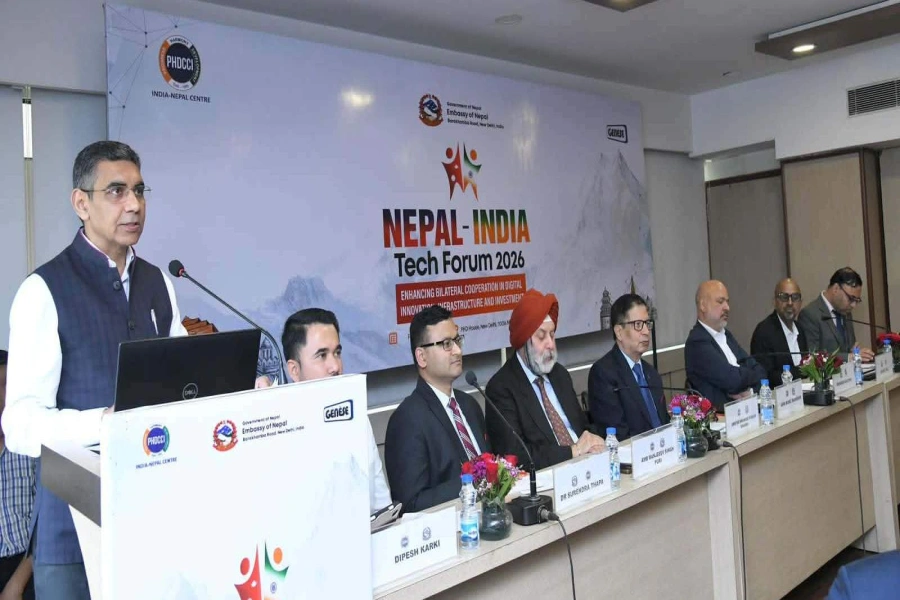I joined the Gandaki Province Academy of Science and Technology (GPAST) not for a job but for a purpose. We were building something new—a space where science stepped beyond labs and textbooks into everyday life. A place where students asked questions and gained fundamental skills, where research didn't sit idle in journals but helped communities thrive and informed more innovative policymaking.
After nearly a decade in Germany, earning a Master's in Agrobiotechnology, a PhD in Natural Sciences (insect chemical ecology), and continuing postdoctoral research, I returned to Nepal in late 2023 and joined GPAST as a Research Associate. Ironically, the role didn't require a PhD. A Master's degree would have sufficed, just like my first research role in Germany in 2016. But for me, it wasn't about titles. It was about impact. I believed I could help shape Nepal's scientific future.
I wasn't alone. Dr. Shiva Devkota (mycologist, PhD from the University of Bern, Switzerland) joined me. Dr. Santosh Koirala (chemical engineer, PhD from the University of Illinois, USA) was already on the team. Dr. Dhaka Ram Bhandari (analytical chemist, PhD from the University of Giessen, Germany) led our research unit. Together, we formed a rare pool of international expertise, working with limited resources, united by the belief that Nepal's science deserved better.
GPAST: Challenges and Bureaucratic Hurdles
At GPAST, we had minimal resources. Our total budget was just Rs 2 crores (≈ $150,000), less than 0.0007% of the province's annual budget of Rs 300 thousand crores (≈ $22.5 billion). No one came here for luxury or prestige. We came because we saw potential. We saw a lab that could open doors, a space that could spark new ideas. And a community that needed someone to believe in science and them.
Running GPAST was never easy. We worked out of a modest office (Pokhara 7) and lab space in Bharat Pokhari (Pokhara 33), nearly 15 kilometers from the city. Most people didn't even know it existed. But those who did know it was something special.
Still, the limitations were real. We didn't have enough people. Most of the staff were on temporary contracts. The budget was tight, often excruciatingly so. Even basic purchases (such as chemicals and materials for experiments) faced layers of approval, delaying work for weeks. Worse, we had no dedicated funding stream. Unlike research institutions with grant access or partnerships, we could not secure external funding. We had no mechanism to apply for grants, no flexibility to seek donors and no bank account. Every rupee had to be squeezed from rigid bureaucratic channels.
Still, we did what we could. We stretched every rupee, stayed quiet, and kept working because we believed science matters. Knowledge shouldn't be a luxury for a few but a tool for everyone.
GPAST's Impact on Education and Research
GPAST became a hub for students, teachers, and young researchers. We designed programs that truly reached people. Over 90 high school science teachers joined our workshops on micro-experiments, low-cost lab tools, and curiosity-driven teaching. We introduced robotics and basic electronics to make science hands-on and relevant.
Gandaki Province set to become 'Bright Gandaki Province'

Over 250 students joined our hands-on training programs, learning to operate scientific instruments with guidance and mentorship. Three PhD scholars worked full-time in the lab, and six bachelor-level interns joined in recent months. This year, we also financially supported over 20 university students for their thesis work. The lab housed equipment worth crores, purchased over the past 4–5 years. But its real strength was the people. Skilled, passionate, and ready to teach. Students walked in uncertain and walked out confident. GPAST gave them not just tools but the space to grow.
We also ran over 2,000 student-focused programs: workshops, science dialogue events, and professional training in everything from data analysis to bioinformatics and microscopy. GPAST became a place where science education turned real, personal, and practical.
The Sudden Shutdown: A Loss for Science and Innovation
Suddenly, the government repealed "The Gandaki Province Academy of Science and Technology Act-2076", formed in 2020, without public consultation or internal notice. The law that established GPAST was scrapped overnight and published in the Pradesh Rajpatra (2082.01.08) in 2025. Within five years, everything collapsed. GPAST was dissolved, and its authority, property, and responsibilities were transferred to the Ministry of Education, Culture, Science, Technology, and Social Development. Ironically, the ministry has no employees who studied science, not even at the +2 (higher secondary) level.
The Constitution of Nepal (2072 BS) mandates the promotion of scientific research, technology development, and the protection of intellectual and technical talents. It states that scientific studies, inventions, and technological advancements will be prioritized. Schedule 7 also designates scientific research, technology, and human resource development as common rights of both the association and state governments.
Despite the constitutional commitment, there was no public discussion, stakeholder engagement, or review of our work. Professional societies involved in research even submitted written letters to the ministry, urging against the closure of GPAST, but the provincial government ignored their concerns. No transition plan was implemented, just a sudden, quiet shutdown. Contract staff were dismissed immediately, as the repeal of the Act automatically ended our contracts. The equipment and buildings were left behind, but the people, the heart of GPAST, were gone.
The Political Gamble: Why Science Lost
As per the Chief Minister's statement in the parliamentary house, all our lab equipment will now be transferred to Gandaki University. This idea is absurd.
GPAST was more than just an institution; it was a vision. Autonomous and inclusive, we didn't serve just one university. We collaborated with students from Pokhara University, Gandaki Medical College, the Institute of Forestry-Pokhara, Prithvi Narayan Campus, the Institute of Engineering-Paschimanchal Campus, and beyond, as well as teachers from over 50 schools across the province. Our doors were open to all. We didn't follow a rigid curriculum; instead, we designed programs based on need and innovation, enhancing cross-disciplinary collaboration and breaking down academic silos.
In contrast, Gandaki University's research unit has a narrow focus, combining teaching and research within the institution. It operates with limited resources and is driven by institutional priorities. Will it host students from other medical, forestry, or engineering universities? Unlikely. It will prioritize its own. Will it lead province-wide science outreach, mentor young innovators, or take risks on experimental projects? Not likely. Its mandate is to serve a single academic institution, not the broader public.
This wasn't about logistics. It was about control.
The decision to dismantle GPAST had nothing to do with performance or science. It was political, driven by short-term power plays, not long-term vision. In Nepal, politics touches everything. But here, it didn't just bend priorities. It buried something rare.
GPAST was never a threat. We weren't chasing power. We were chasing progress. With a tiny team and limited funds, we built a scientific ecosystem where none existed. We showed that even on a budget, real innovation is possible if the system allows it.
Now, the system has chosen control over creativity and bureaucracy over breakthroughs. The equipment might survive. The vision won't.
A Loss for the Province
This is not just about one organization. It's about what it stood for.
GPAST was a promise. A promise that science could grow in Nepal. That young people didn't need to leave the country for meaningful research. Teachers could improve, students could aim higher, and public institutions could lead the way.
Now, that promise is gone.
The lab will gather dust. The training sessions will stop. The students will have nowhere to go. The teachers will go back to old methods. And a generation of young researchers will be left wondering. Why build something if it can be taken away overnight?
We often talk about reversing brain drain in Nepal. We say we want our scientists, engineers, and innovators to return. But what are we bringing them back to? If a small, well-functioning, inclusive, and impactful science institution like GPAST can be shut down so easily, what message are we sending?
This is not just a budget cut. It's a betrayal. Not just of us, the staff, but of the idea that science has a place in public life.
What Comes Next?
I don't know what comes next. Personally, I will find a way to continue working in science. I always have. But I worry about the others; the interns just starting out, the students wrapping up their theses, and the teachers who have just begun to see new possibilities. The research projects we had already invested in, the half-finished experiments, and the samples we carefully collected. Now, all are left hanging.
And I worry about the future of science in Gandaki Province and Nepal. Because you don't build scientific institutions in a day. You nurture them. You protect them. You invest in them. And when they begin to flourish, you don't tear them down; you help them grow.
That's what GPAST needed. A chance to grow. Not a silent burial.











-1200x560_20240402153725.jpg)


























